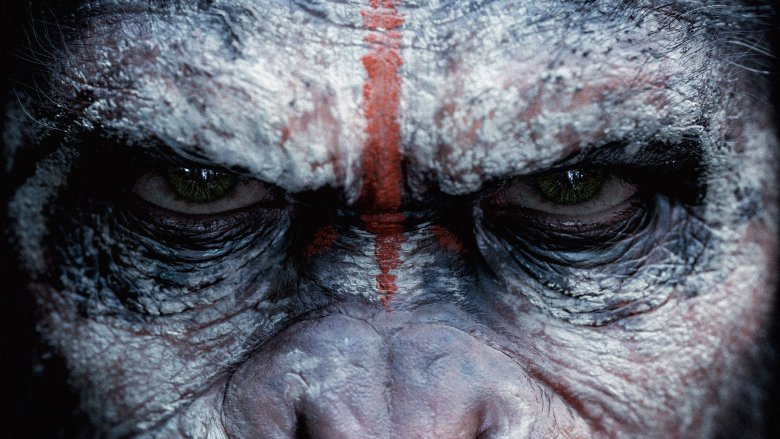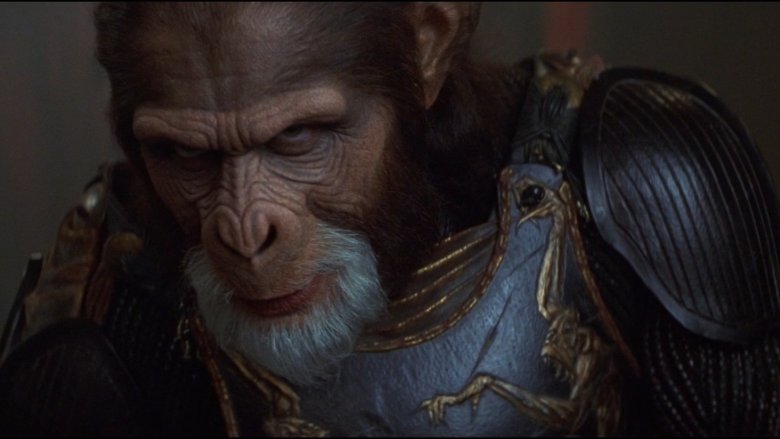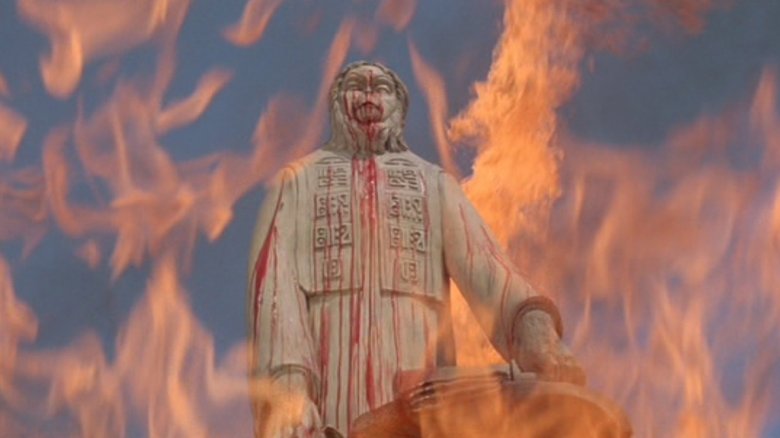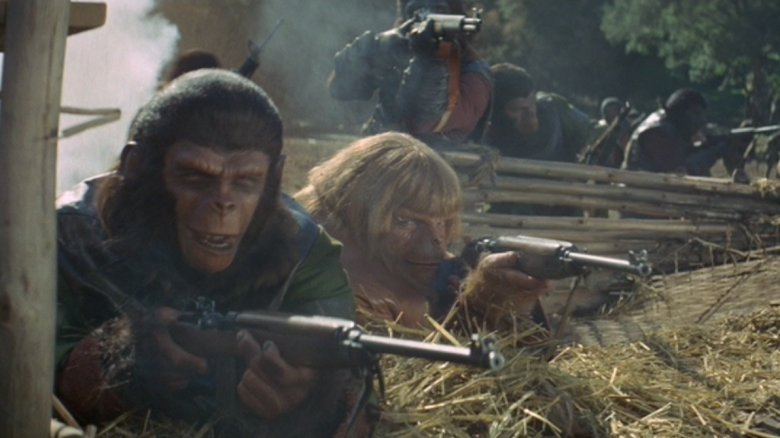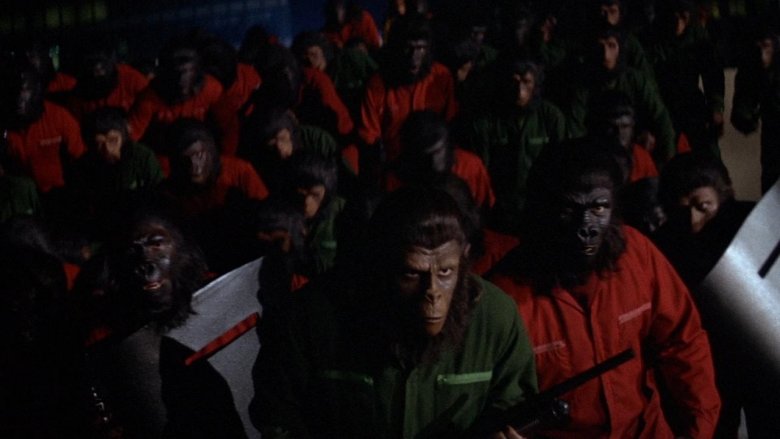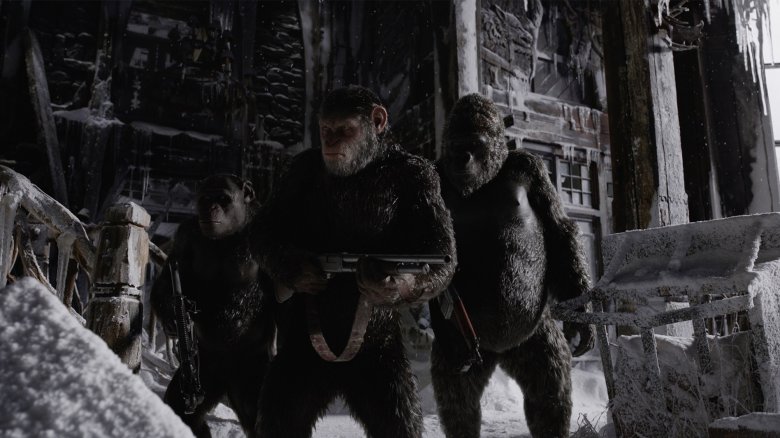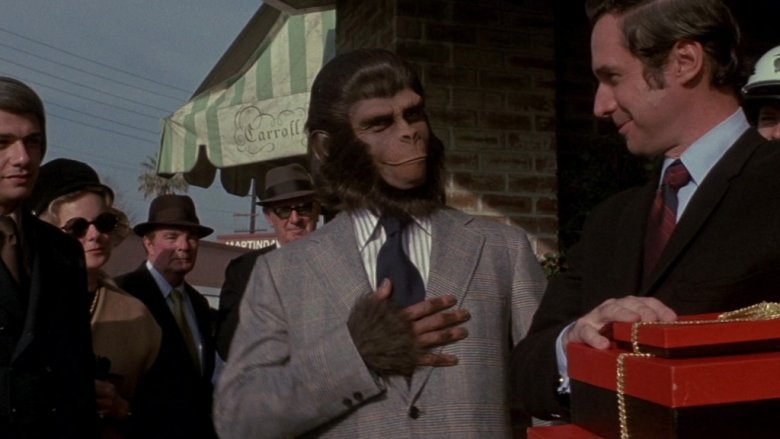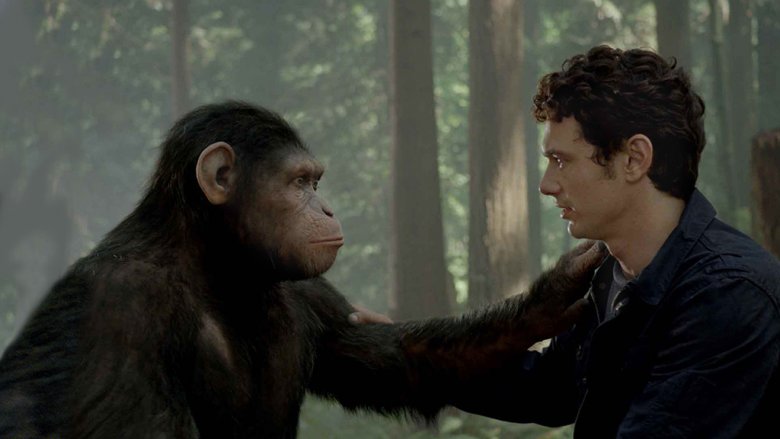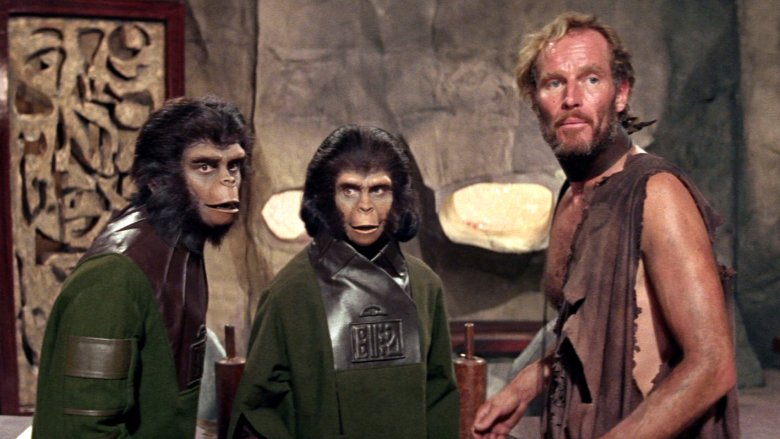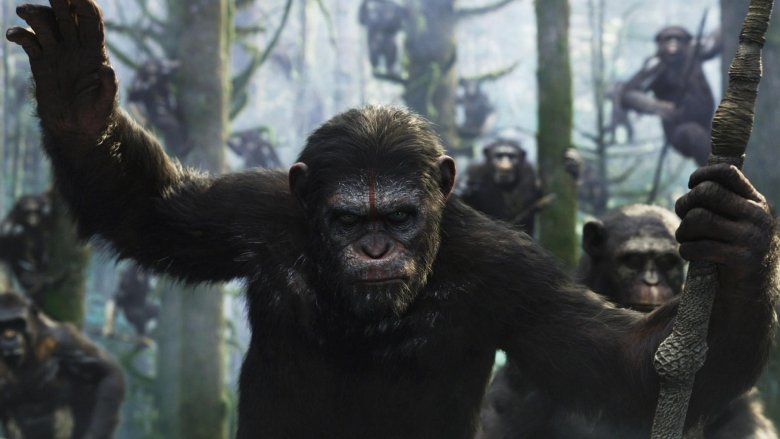Every Planet Of The Apes Movie Ranked From Worst To Best
In 1963, a French spy-turned-author named Pierre Boulle published a novel called The Planet of the Apes. While most have forgotten about poor Pierre, his book launched one of the most successful sci-fi franchises of all time. Between 1968 and 2017, we've gotten nine feature films inspired by Boulle's story (not to mention toys, comics, and two TV shows), and these movies haven't been afraid to grapple with topics like racism, revolution, nuclear war, and the separation of church and state.
Of course, with a whopping nine entries, you're bound to have one or two clunkers, not to mention a few films that are straight-up insane. So if you want to know how Roddy McDowall stacks up against Andy Serkis, or how Koba compares to an army of subterranean psychics, then put down the Sacred Scrolls and strap into your spaceship as we rank the Planet of the Apes movies from worst to best.
Planet of the Apes (2001)
The Planet of the Apes remake finds Mark Wahlberg playing Captain Leo Davidson, an astronaut who crash-lands in a mysterious world and stumbles into a second-rate Tim Burton movie. Okay, okay, that's a bit harsh. The makeup work here by Rick Baker is super impressive, and Helena Bonham Carter does a good job of bringing her character to life. In fact, if the 2001 entry existed on its own, then it might be easier to enjoy the film as pure B-movie schlock.
But unfortunately for the Burton flick, it just can't compare to the Charlton Heston version, a film that uses its wacky concept to grapple with big ideas like colonialism, science vs. religion, and man's inhumanity to man. And while the remake borrows classic lines and iconography from the 1968 movie, it lacks the smarts (and genuine shocks) of the first film, leaving us with a movie that's utterly alien to the rest of the franchise.
It doesn't help matters that Planet of the Apes is totally lacking Burton's unique visual style. Mark Wahlberg probably wasn't the best choice for the lead, and the less said about Paul Giamatti's sleazy orangutan—a character who feels like he stepped out of Ron Howard's How the Grinch Stole Christmas—the better. And then, of course, there's the ending. A twist ending is supposed to drive home a movie's theme or re-contextualize the entire film. But this one is just a twist for a twist's sake, and while the original movie leaves you feeling gut-punched, this one will leave you scratching your head.
But hey, at least we get to see Tim Roth hamming it up as General Thade. He's clearly having a great time under all that monkey makeup.
Beneath the Planet of the Apes (1970)
Without a doubt, Beneath the Planet of the Apes is the weirdest entry of the entire Apes franchise. Sure, the first part of the movie is a bit of a slog as it feels nearly identical to the original movie, but once things get going, Beneath takes a psychedelic trip into some surprisingly dark territory. It's not exactly the tightest screenplay in the world, but what the movie lacks in structure, it more than makes up in bleeding statues and crucified primates.
The sequel focuses on Brent (James Franciscus, looking like a dried-out Charlton Heston), an astronaut searching for the missing crew from the first film. As you've probably guessed from the title, Brent crashes on the eponymous planet, where he encounters a group of grumpy gorillas before escaping underground with Nova (Linda Harrison, the female lead from the '68 flick) in tow. Soon, Brent discovers a race of subterranean humans who spend their days praying to a nuclear bomb. Oh, and did we mention they have psychic powers? Yeah, these guys are a bad bunch, the very definition of a "doomsday cult," so when the apes finally show up, ready for a fight, the mind-reading mutants decide to unleash their god upon the world.
In true Planet of the Apes tradition, Beneath has some big ideas, like the futility of war and man's ability to justify and absolve his own violent behavior. As a result, the film wraps up with one of the bleakest endings in the entire franchise—a series which isn't well-known for its "happily ever afters." So even though the movie is uneven and takes a while to find its hallucinogenic groove, it all pays off once the telepathic mole people show up.
Battle for the Planet of the Apes (1973)
The fifth and final entry of the original series, Battle for the Planet of the Apes takes place in the aftermath of Conquest, with Caesar (Roddy McDowall) leading a colony of humans and apes on the outskirts of a radiated wasteland. Caesar hopes to build a peaceful world in the aftermath of a primate rebellion, but his little kingdom is far from a paradise. After all, while his human subjects aren't exactly slaves, they're not quite equals either.
Still, Caesar is far more benevolent than General Aldo (Claude Akins), a militant gorilla who hates mankind and wants to rule Ape City. So when a group of mutants (the forefathers of Beneath's bad guys) crawl out of their underground lair and declare war on the apes, Aldo uses the moment to seize power, leading to the most impressive action scene of the original franchise. We've got men on motorcycles, gorillas on horseback, and a school bus barreling through a battlefield.
But while the Mad Max insanity makes for a thrilling showdown, Battle never lets us forget the stakes at play. Laying the groundwork for 2014's Dawn of the Planet of the Apes, the 1973 film puts Caesar's ideals to the ultimate test when he's tempted to break the number one tenant of ape law: "Ape shall never kill ape." Despite his best efforts, Caesar soon learns that his own people are just as dangerous as the mutants outside his city, and with one of the strangest final shots in sci-fi history, Battle reminds us that no matter how hard we try, we're all still animals on the inside.
Conquest of the Planet of the Apes (1972)
If you had to pick one actor to represent the Planet of the Apes franchise, who would you choose? Andy Serkis or Charlton Heston? True, they're both reasonable choices, but honestly, if you had to go with just one guy, you'd have to pick Roddy McDowall. The English-American actor starred in four films, playing the historian Cornelius and originating the role of Caesar, 40 years before Serkis showed up. And while McDowall does a great job in the first and third entries (David Watson filled in for part two), he absolutely kills it in Conquest of the Planet of the Apes, playing Caesar in all his righteous, terrible glory.
Set in the far-off future of 1991, Conquest finds a world where mute apes have been turned into slaves, forced to obey every whim of their human masters. However, the one chimp who stands apart from the troop is Caesar, the son of future apes Cornelius and Zira (Kim Hunter), who traveled back to the 1970s in the previous film. Having spent most of his existence living undercover with a friendly circus owner (Ricardo Montalban), Caesar is shocked to discover his fellow primates are being beaten, tortured, and treated like, well, animals. Disgusted with this brave new world, Caesar begins stockpiling weapons and preaching revolution, all of which leads to a violent uprising against his human captors.
More than any other Apes film, Conquest is about racial politics, examining what happens when subjugated groups finally snap and fight back against their oppressors. Yeah, it's a little weird having gorillas and orangutans represent racial minorities, but despite the awkward allegory, the movie's heart is in the right place. You've also got to give Conquest points for ending with a Roddy McDowall monologue of Biblical proportions, although it's too bad the filmmakers didn't stick with their original, darker ending.
War for the Planet of the Apes (2017)
Mix Apocalypse Now with The Bridge on the River Kwai, toss in plenty of Old Testament imagery, and voila, you've got War for the Planet of the Apes. Directed by Matt Reeves, the final entry of the Andy Serkis saga doesn't quite live up to its predecessors, but it's still a powerful and poignant way to end the series.
The film takes place in the bloody aftermath of Dawn, with Caesar (Serkis) and his troop at war with Alpha-Omega, a band of cult-like soldiers who serve the Colonel (Woody Harrelson, doing a Lone Star impression of Marlon Brando). A madman suffering from a serious God complex, the Colonel believes it's his divine duty to wage war against the apes, and soon enough, he captures Caesar's entire colony, forcing them into slavery.
With his people in bondage, Caesar becomes a modern-day Moses, squaring off against a camouflaged pharaoh. But as he fights to free his tribe, Caesar is forced to wrestle with his inner-Koba, the dark side that wants revenge against the man who ruined his life. Complicating matters even further, Caesar has to deal with a mute girl (Amiah Miller), a mutated virus, and a sweet-but-spineless ape who sounds a lot like Steve Zahn.
As usual, Serkis is absolutely on point with his performance, and Harrelson succeeds in creating one of the creepier villains of the franchise. And while we're passing out compliments, let's not forget Michael Giacchino's fantastic score or the absolutely breathtaking animation (seriously, Maurice looks like a living, breathing orangutan). Having said all that, War makes a pretty big mistake by not featuring a world-ending conflict between man and beast. Instead, the movie is more concerned with a lackluster third threat looming on the horizon, one that robs us of the long-awaited showdown between humans and apes. Nevertheless, while the film should've spent more time developing the conflict between Caesar and the Colonel, War for the Planet of the Apes is pretty solid way to finish series, especially compared to certain other trilogy films out there. (Yeah, Spider-Man 3 and The Matrix Revolutions, we're looking at you.)
Escape from the Planet of the Apes (1971)
Released in 1971, Escape from the Planet of the Apes was the third film in the original series, and it's the one that sent things in a completely different direction. While the first two Apes films took place in the future, this one brought things back to present day. It also shifted focus from the humans to the apes, setting the standard for most every subsequent entry to come.
After the cataclysmic ending of Beneath, we discover that Cornelius and Zira—major characters in the first two movies—have managed to escape death and travel back to 1973. After landing in a world controlled by humans, the two intellectuals are initially treated as celebrities. They're introduced to members of high society, taken on extravagant shopping trips, and given human pleasures like "grape juice plus."
Unfortunately for our heroes, not everyone is pleased to see these speaking simians. Dr. Otto Hasslein (Eric Braeden), science advisor to the US president, quickly realizes that Cornelius and Zira come from a world where apes have enslaved humans. While these two particular chimps pose no threat, Hasslein worries about what's to come, and after learning that Zira is pregnant, he decides to murder the baby at all costs, hoping to prevent the oncoming ape-pocalypse.
Escape from the Planet of the Apes is so brilliant because it gives us both heroes and villains we can empathize with. Naturally, when the government turns on Cornelius and Zira, we want the good-natured apes to get away. On the other hand, we totally understand where Dr. Hasslein is coming from, making him one of the most interesting bad guys in the entire franchise. And while the film definitely has its light-hearted, quirky moments, Escape ends with the most shocking Apes climax of all time, a finale that will shatter moviegoers and leave them feeling bummed about the future of humanity.
Rise of the Planet of the Apes (2011)
Tim Burton, take note. This is how you reboot a franchise. It's not about the action (which is awesome). It's not about the special effects (which, give it a few minutes, are totally immersive). It's about the characters, the story, the themes, and boy, does Rise of the Planet of the Apes check off every single one of those boxes.
As for the plot, the film follows Caesar (Andy Serkis), a chimpanzee who develops human intelligence courtesy of a drug meant to cure Alzheimer's. But as he grows more and more aware of his lot in life, Caesar starts questioning why he's forced to wear a collar, why he's abused by his captors, and why he isn't afforded the same rights as his human neighbors. Frustrated and fed up, Caesar morphs into a chimp Che Guevara, striking a blow for animal rights and encouraging his fellow apes to rebel, sparking a fantastic fight scene across the Golden Gate Bridge.
Admittedly, the human characters here are a little thin, but while James Franco and Freida Pinto fail to impress, Serkis is absolutely at the top of his game. Summoning all of his Lord of the Rings expertise, the English actor has created one of the greatest characters of 21st-century cinema. Maybe that sounds hyperbolic, but CGI Caesar feels like a creation straight out of Shakespeare, and while he barely utters a single line of dialogue, Serkis conveys so much pain, suffering, and hope with just his body language and facial movements. Why the man hasn't gotten an Oscar yet is impossible to understand.
Planet of the Apes (1968)
Here it is—the one that started it all. Directed by Franklin J. Schaffner, the original Planet of the Apes is pretty much the perfect sci-fi movie. There's the Academy-award winning makeup by John Chambers, the amazingly alien score from Jerry Goldsmith, and a brilliant screenplay written by Michael Wilson and Rod Serling of The Twilight Zone. Roddy McDowall and Kim Hunter are in fine form as Cornelius and Zira—the intellectual apes with liberal ideas about humanity—and then there's Charlton Heston front and center as George Taylor, the nihilistic astronaut stranded on a planet full of, well, apes.
After crashing on a barren planet, Taylor finds himself in a world where humans live in the wild and grunt like animals. On the flip side, the apes ride horses, carry guns, and conduct scientific experiments on their Homo sapien subordinates. Led by the religious-minded Dr. Zaius (Maurice Evans), the apes believe themselves superior to man, and if anyone says they might've evolved from humans, they're immediately shut down by Zaius and his orangutan counsel. Of course, Taylor's arrival throws the whole system out of whack, and to his shock, the misanthropic spaceman suddenly finds himself a champion of humanity.
And then there's the twist. You're probably well aware of how the ending goes down. It's plastered all over Planet of the Apes merchandise, and it's been parodied a couple of times over the years. But if you step back and approach the film with fresh eyes, you'll find the finale works like gangbusters. It's a twist up there with The Usual Suspects and The Sixth Sense, and it establishes the overarching message of every single Ape film to come: that man is inherently violent, and he's going to damn this world to hell.
Dawn of the Planet of the Apes (2014)
The second installment of the Andy Serkis trilogy, Dawn of the Planet of the Apes is perhaps the most human movie of the entire franchise. A decade after the Simian Flu has decimated humanity, Caesar finds himself a husband, a father, and leader of an impressive ape tribe. In this post-apocalyptic world, all Caesar wants to do is live in peace, but things are turned upside down with the arrival of Malcolm (Jason Clarke), a human hoping to use a dam on Caesar's turf to restore electricity to a nearby city.
Initially wary of Malcolm's intentions, Caesar eventually allies himself with the good-hearted human, hoping to forge a new future for man and ape. Unfortunately, his utopian plans fall apart thanks to his right-hand primate, Koba (Toby Kebbell). Perhaps the best antagonist of the entire series, Koba was once a laboratory ape and was horribly scarred by scientists, so it's no wonder this bonobo hates every human on earth. While Caesar calls for cooperation, Koba wants war, and what makes Dawn so great is that we truly understand where both of these apes are coming from.
Tragically, the power struggle between Koba and Caesar leads to a showdown of epic proportions, and while the battle scenes between ape and man are a sight to behold (for crying out loud, we've got a bonobo on horseback, wielding dual machine guns), it's honestly one of the most painful action scenes of all time. There are no cut-and-dried heroes and villains here. Everybody's right, everybody's wrong, and their failure to put aside their prejudices and talk to one another leads to an absolute bloodbath. With an ending that feels a little too close to real life, Dawn of the Planet of the Apes is social commentary at its most heartbreaking, proving this franchise is far more than just silly chimps and talking gorillas.
